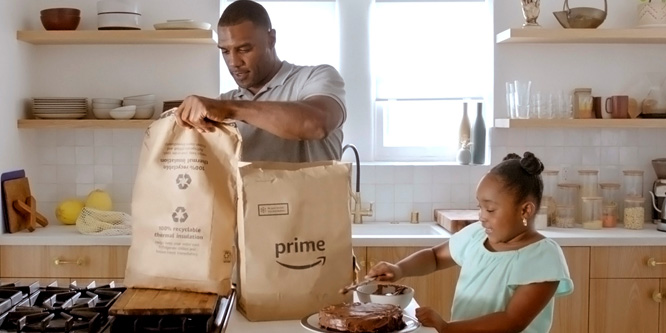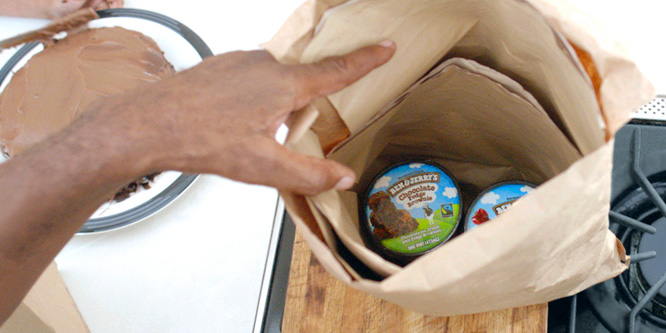
Photo: Amazon
Will new curbside-recyclable insulated packaging give Amazon a sustainable grocery edge?
Amazon.com is launching new curbside-recyclable insulated packaging that the company says does away with the need to use bubble bags or plastic liners.
Stephenie Landry, vice president, Amazon Grocery, writing on the company’s blog, claims that the new packaging will have a positive environmental impact.
“Moving to all curbside-recyclable insulation packaging reduces material waste, and each year replaces approximately 735,000 pounds of plastic film, 3.15 million pounds of natural cotton fiber and 15 million pounds of non-recyclable mixed plastic,” she wrote. “The new packaging is also produced regionally in the U.S., enabling us to deliver it to Amazon Fresh grocery hubs, stores and Whole Foods Market locations with fewer miles traveled across the supply chain.”
Ms. Landry said that the packaging was well received by customers during testing, not only for being more environmentally friendly, but because it works at keeping frozen and refrigerated items as cold as they are intended to be.
Joe Rake, a senior program manager on the grocery delivery packaging team, headed up the project for Amazon. He said the new packaging was developed in-house because the company couldn’t find a viable solution from third-party providers that met Amazon’s “physical, thermal and design criteria.”

The packaging’s design was modeled on “recycled paper tissue layering that’s relatively common in the moving and packing industry but that we reinvented for our grocery delivery customers,” said Mr. Rake.
Amazon tested the new packaging in internal and external laboratories in the U.S. and Europe to “validate” that it would keep products at the proper temperature throughout the time it took to deliver orders to customers’ homes.
The company moved its testing out of controlled environments to begin pilots in 2020 in select markets and “under a variety of temperature scenarios,” said Mr. Rake.
“As we slowly rolled this out, our food safety team conducted secret-shopper programs to validate the thermal effectiveness of the packaging,” he said. “We also paid very close attention to customer feedback along with employee feedback on how to best pack orders using the new packaging.”
Discussion Questions
DISCUSSION QUESTIONS: Do you expect Amazon’s new packaging to be popular with its customers? Do you expect Amazon’s grocery competitors to follow suit and reverse engineer its packaging or develop their own environmentally friendlier alternatives?


Amazon, like all businesses and citizens at large, must do more to minimize environmental impact. If this new packaging actually is better for the environment, Amazon should encourage everyone to use it – even competitors. The new packaging from Amazon sounds promising and anything that reduces environmental impact is worth considering, but the impressive sounding environmental friendly stats quoted need to be contextualized in order to truly understand if the move is merely green-washing.
As one of the largest producers/sources of packaging materials, it is great to see Amazon taking the lead and setting the standard for recyclables. Customer education should be a part of this initiative, with every curbside delivery, given consumer behavior around recycling is the most challenging piece of this equation.
Amazon will not have a sustainable grocery edge until it has more of a retail footprint closer to consumers.
It simply does not have the retail footprint to compete on the same scale as Walmart in the market.
If this packaging works as advertised, it’s a great innovation for Amazon and the planet. While I recognize this would be a differentiating option for Whole Foods, I wonder if there would be enough goodwill to be gained from environmentally-conscious consumers to make it worth sharing the technology with other grocers…
One of the most common concerns I hear in my circles about Amazon is that people’s garages and trash bins are full of boxes, liners, bubble wrap and all the rest of the waste that comes with online ordering. Anything that Amazon can do to eliminate as much of that waste as possible is going to be popular with consumers.
This is a good thing – although I can’t tell what was replaced by this packaging. The statement from Amazon talks about replacing all kinds of packaging for Amazon online shoppers, but the primary discussion is just about home delivery of groceries.
On the other hand, I have a general frustration with all shippers. In 1991 I worked for a software company which delivered all our goods in fully curbside recyclable packages. It’s sad that we’ve lost 30 years of opportunity to bring forward what was possible that long ago through smart, paper-based design.
Doug, in our town, Amazon/Whole Foods used silver, bubble wrap-insulated bags to pack frozen and refrigerated items for home delivery. On some orders, we would be left with a half dozen. They are not acceptable for recycling in NYC. I asked Amazon (a few years ago) if they had a program for re-using or recycling them and they said no, apologetically. Great to see they came up with a solution.
This is a welcome development not just for Amazon, but for the industry. Will it mean new customers? Not likely, but someone must lead the way. I fully agree with Mark’s comment that Amazon should encourage everyone to use it, even competitors.
However competitors are moving in the environmental packaging direction. Several European start-ups are focusing on this. In a year or two, everyone will be doing something similar.
Consumers don’t have strong feelings either way about packaging, so Amazon is smart to take measures that improve its environmental impact in such an unremarkable way. These types of efforts are wins for everyone.
We will need brands to take sustainability strides that do cause changes in consumers’ behaviors, but moves like this are great first steps for companies to start walking their ESG talk.
Again, Amazon pioneers another logistics innovation. This is the latest episode of envelope testing of alternatives to better satisfy its customer base. Competitors need to fast follow.
I don’t see any reason why the new packaging should not be popular, assuming that it performs up to expectations. I fully expect that all companies will have to engineer or reverse engineer their packaging at some point in the near future, and not just because of Amazon. In the digital age we are just producing far too much packaging material.
Chalk up another Amazon innovation delivered to the market. This is fantastic news for sustainability efforts, and it will galvanize many of the Whole Foods loyalists, but I don’t think it will drive a material change in consumers’ behavior as it relates to switching store preferences. The typical H-E-B, Publix, Kroger or Walmart shopper is not going to wake up and say, “hey, I’m now going to shop at Whole Foods because I get different bags at checkout.” Will other retailers follow suit with new packaging? Probably, but they are likely months and years behind Amazon.
Sustainability matters and will remain at the forefront of our political, business, and socioeconomic considerations in the next five to 10 years. There are expectations from governments and consumers for brands, both big and small, to come up with executable sustainability initiatives that will have positive material impacts on our world.
Amazon, with its global scale, has a significant carbon footprint. This new recyclable packaging strategy will be extremely popular and will resonate with environmentally-conscious consumers. The program is a very positive step in the right direction. It will be even more encouraging if Amazon extends this strategy for the home delivery items, having an even more significant positive impact.
If you repost this item a year from now, I think we will find that the number of people who responded to the survey will say that this program is more important than they do now. As the need for recycling and climate change become more mainstream, moves like this will significantly impact where people shop.
The good thing is, this move is good for the environment and, consistent with Amazon, smartly done. The not so good news is that it may not make a difference in overall customer loyalty. Convenience still rules curbside and last mile. Will consumers appreciate environmentally friendly packaging? Sure. Will they change their buying behaviors because of it. Probably not.
Given Amazon’s relentless focus on customer experience, it’s not surprising to see even their environmental efforts are still customer-centric; whether it changes consumer behavior or not.
These days, customers care about long-term sustainability. According to Deloitte research, approximately one-third of buyers stopped buying specific products due to ethical sustainability concerns.
Retailers who understand how to attract such clients will be the trailblazers. Amazon, for example, is doing a fantastic job of becoming a trendsetter by providing ecological packaging.
But the real question is which retailers are truly innovative in their pursuit of sustainability and which are duplicating and following others’ strategies. Because originality always wins, more retailers should begin to take sustainability seriously.